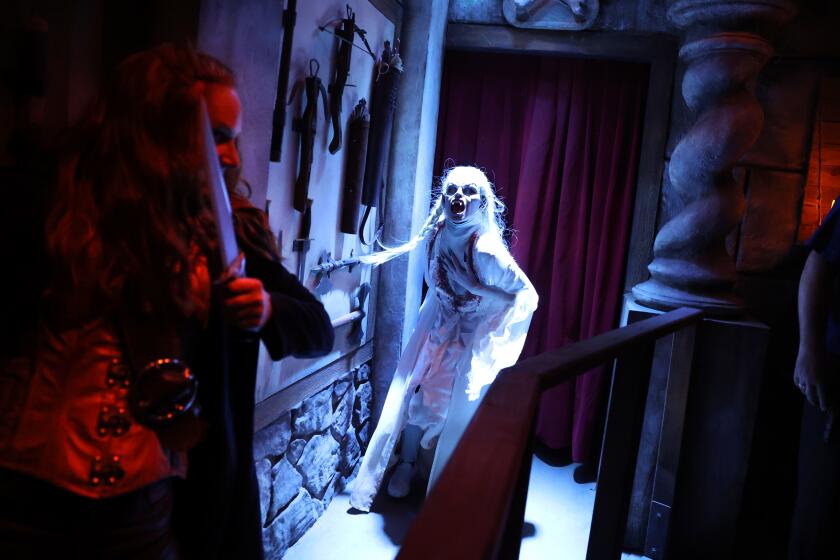Picturing paradise
Sometimes I miss Los Angeles. I live and work smack in the middle of it. But sometimes I still miss it.
I figure I can place the origins of my nostalgia in the year I spent in Madrid, when I was 14. That was when I made Joni Mitchell’s Vietnam War-era paean to my home state my personal anthem. Although I can’t say I was homesick for family and friends, I sure identified with Mitchell’s longing for warmth and refuge in L.A. Feeling lonely in Europe, she wrote:
Still a lot of lands to see
But I wouldn’t want to stay here
It’s too old and cold and settled in its ways here
Oh, but California
California I’m coming home
I came home and discovered, of course, that all of what she craved -- and what I thought I missed -- L.A. couldn’t realistically deliver. Was I disillusioned? No doubt. But my nostalgic notion of L.A. has never left me. I’ve never shaken the feeling that L.A. should live up to my expectations.
All great metropolises have myths and meta-narratives through which we filter our own personal experiences. When my father visited me during the years I lived in New York City, he couldn’t help but see the city through the lens of movies he had seen as a child -- New Yorkers arriving at the theater in top hats and tails. And how many American college kids head for Paris harboring a Hemingway Lost Generation dream? We carry with us preconceived notions of what places are or should be, and we’re always grappling with the gap between fantasy and reality.
But no city is more burdened by its myth than L.A. That’s because ours -- crafted by regional boosters even before the birth of L.A. as a modern American city -- is the ultimate myth: Los Angeles as paradise. It makes the gulf between the ideal and the real deeper here than anywhere else.
Think about it. In London, most people do go to pubs, just as you’d think they would. In Paris, the locals do routinely hang out in cafes. But how many people do you know in L.A. who actually match the description of the perfectly sculpted, sun-loving beachgoers who populate this town in the world’s imaginations?
Because the real people and the real place were never destined to match expectations, L.A. has long been a source of disillusionment. First came noir in the 1930s and ‘40s, but by the end of the 20th century, hellishness was more than the theme of a novel or the way to light a movie. The 1992 riots were the moment when shadows trumped the sun. Over the last few decades, much of the writing on the city has devolved into a long dialectical argument over whether L.A. is really heaven or hell.
Now there are signs that we’re emerging from the grip of this facile dichotomy. One powerful example is the week-old exhibition at the Huntington Library: “This Side of Paradise: Body and Landscape in Los Angeles Photographs.”
Jennifer Watts, the show’s co-curator, told me she was tired of what she called “extremist renderings of L.A,” the Manichean battle between sunshine and noir. Nor was she intent on undermining L.A. stereotypes. As she put it, “There are powerful kernels of truth in the stereotypes,” and the exhibition takes the paradisiacal as its starting point. Still, it’s not judgmental when we don’t live up to the hype. To my mind, the most engaging photographs capture the chasm and the connection between the ideal and the real; they put heaven and hell in one frame.
Like John Divola’s “Zuma #63,” a sublime, color-saturated portrait of an abandoned, fire-ravaged, vandalized house on the Pacific’s edge at sundown. And then there’s Garry Winogrand’s 1969 black-and-white image: three young women sporting bouffant hairdos and miniskirts walking past a beggar in a wheelchair on the Walk of Fame. Things are not what they seem in Tinseltown, but the afternoon light still telegraphs beauty, glamour, paradise.
When I got home from the Huntington, I pulled my copy of John Fante’s 1939 Los Angeles novel “Ask the Dusk” off the shelf and found again a passage that puts into words the same thing the Huntington photographs capture -- embrace paradise, embrace disillusionment.
“You’ll eat hamburgers year after year and live in dusty, vermin-infested apartments and hotels, but every morning you’ll see the mighty sun, the eternal blue of the sky, and the streets full of sleek women you never will possess, and the hot semi-tropical nights will reek of romance you’ll never have, but you’ll still be in paradise, boys, in the land of sunshine.”
Amen.
Sign up for The Wild
We’ll help you find the best places to hike, bike and run, as well as the perfect silent spots for meditation and yoga.
You may occasionally receive promotional content from the Los Angeles Times.



